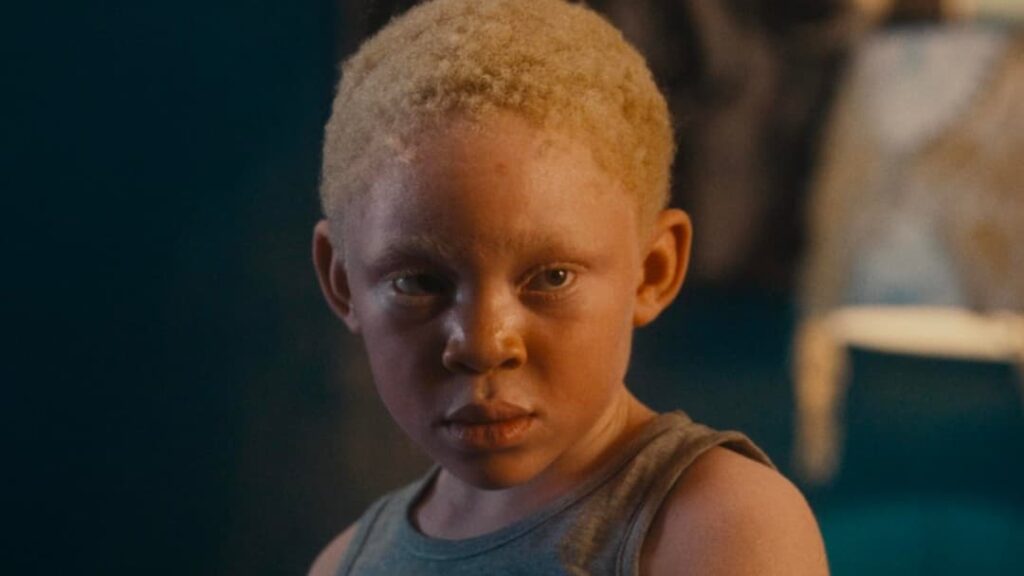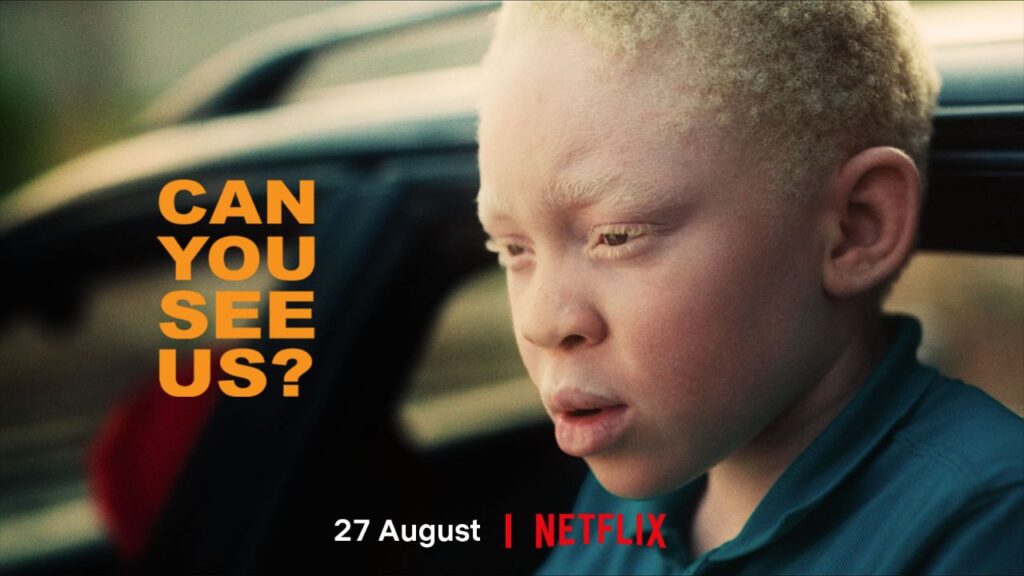Can You See Us? is one of those few films that espouses multiple layers of meaning. What proves elusive reveals itself with ease on repeated watch…
By Seyi Lasisi
After watching the Kenny Mumba-directed Can You See Us?, a film weaved around the childhood of a boy with albinism, I went through an hour-long soliloquy. This Zambian debut feature film on Netflix, which explores the stereotypes and struggles associated with living with albinism in Zambia, demanded that I recall my childhood impressions of persons with albinism. Growing up in south-west Nigeria, the term, oyinbo, was the word used to refer to Europeans, and the first time I saw a Westerner, I instinctively knew these light-skinned men with pointy noses, these oyinbos, were similar to other light-skinned children (children living with albinism) in my neighbourhood. For us children, we subverted “albino” for “oyinbo”, and in our childhood naivety, conceded that the oyinbos with albinism with their freckled skin, were different from us, and that they were closer to wealth than we were.
This personal introspection is important, as this film orbits primarily around the childhood experiences of Joseph (Thabo Kaaba), a boy living with albinism, as inspired by the lived experiences of Mr John Chiti, a Zambian musician cum director, and founder of Albino Foundation of Zambia. The film, co-written by Andrew Thompson and Lawrence Thompson, in fluent cinematic language, reveals how children embrace stereotypes and myths, and become foot soldiers in perpetuating such beliefs. In this coming-of-age drama, Joseph navigates a society that sees his skin colour as an anomaly. Kennedy (Kangwa Chileshe), Joseph’s father, rejects him when he sees his skin colour, and his mother, Chama (Ruth Jule), becomes saddled with the responsibility of fending for herself and Joseph. Fortunately, Martin (Kondwani Elliott Zulu), Joseph’s stepfather, wilfully chooses to adopt the boy as his. In Joseph’s neighbourhood, he becomes the subject of scorn from his peers. They call him mwabi, (Nyanja word for ghost), and seeing Joseph’s countenance, I could not help but wonder, how the children we used to call oyinbo felt about this.
When the film begins, Kennedy is seen embracing the demands of fatherhood, as his wife, Chama, is due to have a baby. He is seen running to a neighbour’s house to plead for his car and defending his wife from his mother’s (Mosiska Tembo Chada) accusatory glares and comments. But despite all these, Kennedy rejects Joseph at first glance, and cowardly distances himself from his son’s life due to deeply entrenched stereotypes against people with albinism. Through this action, Kennedy becomes a symbol of the societal detachment people with albinism experience.
(Read more: Demystifying Albino Myths and Misconceptions in the Mass Media)
The camera work, through close-up shots, focuses attention on physical motions; facial expressions and hand gestures that can be interpreted as emotive displays of affection and protection. By capturing these seemingly trivial but indispensable moments, the film’s cinematography, with the support of the actors, carries the emotional core of the film. Kennedy’s expression as he rejects Joseph is paired simultaneously with Chama’s grief-worn face, which is further embellished with gloomy soundtracks. The soundtrack, which sways from funereal to comforting tones underlines the emotion-enacting scenes. By maintaining an almost elusive and tone-down cadence, the soundtrack filters and meets viewers’ auditory senses in ripples.

Another technical aspect of the film that adds to the list of its admirable qualities is the editing. The film editing helps establish viewers into the emotional ethos of the film, and it achieves this by occasionally casting back the audience’s gaze through character-defining flashbacks. Although I don’t pose to be fluent in the gaffers’ language, there is something symbolic about the lightning of Can You See Us? Lighted by Rajabu Mohammed Mkugwa and Charles Ndumia Ndung’u, the tiny hues, and sparks of yellow light in Mad Man (Robert “Big Rob” Nyirenda), Joseph’s mentor, room whenever Joseph visits are a visual metaphor and foreshadowing of happiness and freedom that will gradually dim the gloom in Joseph’s life.
One of the few epiphanic moments in the film is when Martin gifts his adopted son a toy car. Before this, Joseph only interacted with society from the sideline, peering through his room window as other children played. This gesture symbolised Joseph’s freedom to move beyond the confines of his room to play outside like the others. In a way, it metaphorically informs the audience that people like him – people with albinism – can and should be seen.
(Read more: How Africa is Turning Against People with Albinism )
On a few occasions, Jule’s acting falls short. Portraying a mother whose child’s appearance draws public attention comes with huge demands, and her facial and verbal expressions are sometimes flat, failing to safely anchor the conflicting emotional depth her role requires. Chileshe and Zulu’s acting, however, match the emotional requests of their distinct role. Joseph is surprisingly played by a girl, and Kaabo’s acting in this bildungsroman drama is deserving of excessive laurels. There is a carefulness in her relationship with people around her. The caution instils a tenderness into the conversations Joseph has with his friend, Sharon (Chipego M. Mwiinga), his mentor, Mad Man, and his parents. Kaabo’s acting carries the well-informed posture of one well-attuned to the subtle and verbal demands of her role. Although there is a sizeable and noticeable reluctance in Joseph’s attitude, which shows in his fright around people, there is always a slew of courage and determination in his words and actions.

(Read more: Safari Review: Bill AfwaniI-Directed Film is a Successful Casting of Child Actors)
Miles away from any trace of modernity, where there is little access to well-founded education, and to electricity paired with TV programs that connect its inhabitants to the world, one would think that the working class are the only groups that perpetuate stereotypes. But as shown in Can You See Us? the wealthy and elite also abhor these archaic beliefs. Martin and Sharon represent the working class, while Kennedy and his wife are the elite. The film alternates between these opposite social and economic groups in an oratory manner, lecturing viewers that stereotypes are not only peddled by certain social classes. It is a part of human existence, and depending on an individual’s level of exposure, a child can be nurtured with harmful stereotypes.
Can You See Us? is one of those few films that espouses multiple layers of meaning. What proves elusive reveals itself with ease on repeated watch. The title of the film also offers different meanings when one replaces the interrogative tone of the title – the question mark – with a declarative timbre. On one hand, for Africans with albinism, it says, we are here to stay. On the other, for filmmakers from Zambia, it is to announce their presence. The title poses as a public declaration. In spotlighting the daily experiences of Africans living with albinism in a conservative society, Can You See Us? encourages empathy toward people with albinism. Through its empathetic representation, the film passes a poignant point to society for Africans with albinism. Thus, in its compassionate approach to telling the story of Joseph, the film subtly instructs viewers to do away with stereotypes.
Rating: 4/5
(Can You See Us? is currently streaming on Netflix)
Seyi Lasisi is a Nigerian student with an obsessive interest in Nigerian and African films as an art form. His film criticism aspires to engage the subtle and obvious politics, sentiments, and opinions of the filmmaker to see how it aligns with reality. He tweets @SeyiVortex.




